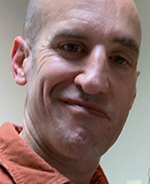Get help! Don’t Fight Cancer Alone
— Categories: Ependymoma Community Posted on November 18, 2019
Ependymoma survivor, Matt, shares how to utilize resources the medical system makes available.

By Matt C.
As an ependymoma survivor and guest blogger, Matt shares his advice to help others within the ependymoma community cope with their illness.
If you are reading this, chances are you (or a loved one) have heard the fateful phrase, “You have cancer.” No one wants to hear that phrase, but a lot of people do. Too many, in fact.
But that “too many” is a key to decoding how to cope with cancer.
I learned about my first tumor during a doctor visit for frequent headaches. That was in 2007. I was in my mid-30s, healthy, a college graduate, and prideful enough to believe that I could fight cancer on my own.
Ignorance may be bliss, but it’s also expensive, and boy did my ignorance cost me.
Brain cancer struck my family again in 2015. This time it was my Dad who was diagnosed, and after eight years of my own brain cancer experiences, I was better prepared to be a caregiver.
Then my cancer recurred in 2017. Hearing that the cancer had returned was alarming, but I had just seen (from my Dad’s experience) how much care, treatment, and resources had evolved since 2007. I was prepared and knew that I needed to make treatment for my recurrence different, and better, than both my first experience and what Dad endured.
In 2007, I ignorantly tried to do everything myself. Certainly, there were doctors and nurses involved, but I believed I could take care of everything else. That was a gross overestimation, and I leaned on more resources when Dad got sick. For my recurrence, I was going in with eyes wide open and was prepared to utilize any and all help that was available.
Long story short, I learned my lesson.
Complex medical care is just that . . . complex. Patients aren’t meant to be experts in their care or illness, nor do they need to be. There are a multitude of resources available to everyone facing brain cancer. It took ten years for me to learn, but my advice is to use those resources – use them all.
Seek Help from Your Physician
The first place a patient should seek help is through their physician. And when it comes to utilizing other expertise, a patient’s doctor should be relying on a network of assistance. That’s right, even your help should be getting help!
Brain tumors and their treatment are astoundingly complicated. As such, a physician should allow other professionals to do their jobs. Your neurologist has access to an array of specialists and options, including oncologists, neurosurgeons, radiologists, clinical trials, pathologists, therapists, a tumor board, and more.
Think of all that expertise like tools in your doctor’s toolbox. Ideally, a patient should want their physician conducting the orchestra – all the experts should contribute in their own capacity and your doctor coordinates things and tunes them to your case. As a patient, you have one point of contact – your physician – but an army of help, knowledge, and expertise.
Nowadays, the continuum of care extends far beyond brain surgery or radiation, and medical systems have greatly increased offerings to patients. The thing that has changed the most since my first brain tumor experience is how many resources are available to patients beyond their medical care.
Additional Resources: The More, the Better
Need emotional support? It’s available. Utilize social workers and support groups.
What about financial assistance? It’s available. Talk to counselors.
Need help after treatment? It’s available. Rehabilitation therapists are on standby.
Beyond those three traditional resources, many medical systems have continued to offer more options. Nurse Navigators or Patient Experience Coordinators can help organize things for patients and make sure all needs are being met. A full suite of wellness offerings such as diet, nutrition, yoga, and mindfulness are often available at hospitals or local clinics. There are even initiatives available concerned with quality of life measures like pain management.
The more, the better.
The more, the merrier.
The bigger, the better.
No matter how it’s said, the fact is that patients are better off getting help. More people involved in a patient’s medical team allows patients to spend more time receiving care and less time figuring out how to navigate the healthcare system.
Whether someone is an experienced patient or is newly diagnosed, he or she needs to rely on the resources the medical system makes available. First, make sure your doctor isn’t trying to do too much – he or she should be conducting the orchestra. Second, utilize every ancillary resource available, including the ones you don’t think you need.
I’ve tried to do it alone, and I’ve recruited an army of helpers. Don’t make that mistake. Get help!
